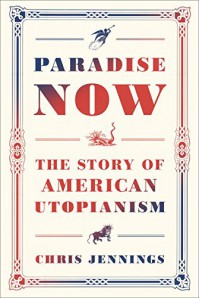Reflections
Eager reader of history, mystery, classics, biographies, steampunk, lit fic, science, scifi, and etc. My reviews are mostly positive--I rarely finish or write about books I don't enjoy. My TBR is too high for that.
Utopias in nineteenth century America

Deeply held convictions about religion, science, and the industrial revolution converged in mid-nineteenth century America and created a flurry of experimental utopian communities whose enthusiastic members hoped they were building model societies that would change the world. This fascinating, hard to put down, sometimes heartbreaking history profiles five of the hard working, ideal rich groups--the Shakers, New Harmony, the Fourierist phalanxes, Icaria and Oneida. While the utopians held many core ideas in common, some of their beliefs varied widely, from multi-partner free love to celibacy, but unity predominated so the groups supported each other, exchanged members, and saw themselves as fellow travelers.
Their results were mixed, with a few of the communities being more viable than the others, but none of them prospered in ways that made them catalysts for a global reorganization of civilization. In spite of that, many of the progressive views the utopians all agreed on were eventually embraced by the population at large, including the right of women to be treated equally, the benefits of strong public education for democracy, the advantages of a diverse society, the need for a social safety net, and the dangers of unchecked markets.
Though setting up these prototype paradises involved a lot of arduous labor, the morale and happiness of participants was boosted by their idealistic mission, common purpose and close community, making it heartbreaking for the utopians when their groups fell apart. At a time when most Americans lived much more isolated lives under social strictures that limited contact between men and women and people of different classes, members of the utopias lived, ate, and worked together during the day, and held dances, lectures, singalongs, assemblies, and/or classes in the evenings--high-times that sound like great fun even to this privacy loving introvert.
Because of social changes they helped inspire, utopian communities ultimately did have some impact on the way culture has advanced since the nineteenth century, which is why the author suggests that while we are now obsessed with dystopias and picturing how things could go very wrong, there would be value in following the lead of utopians by imagining what we think an ideal world would look like.
Paradise Now is full of poignant, lively, and engagingly written insights into the mid-nineteenth century zeitgeist--mainly the time before the Civil War. It’s detailed without being ponderous, and reflective without being opinionated. I found it utterly riveting.
I read an advanced review copy of this book provided by the publisher at minimal cost to me. Review opinions are mine.
 12
12


